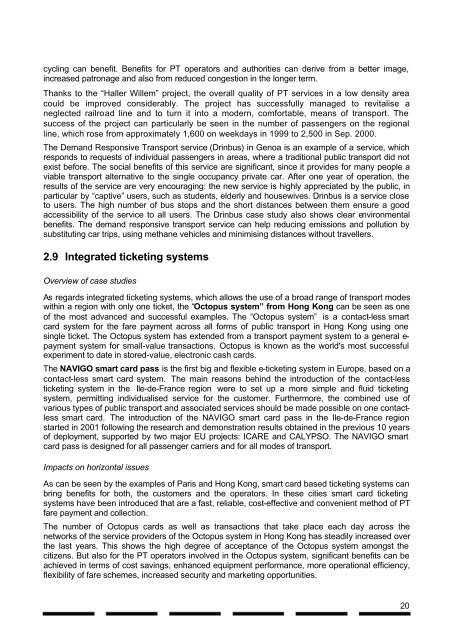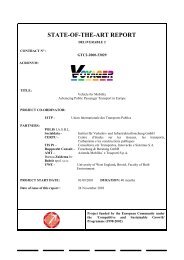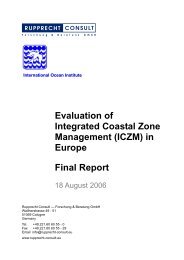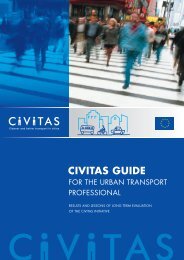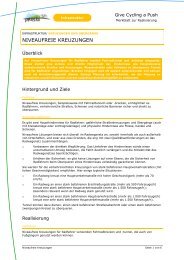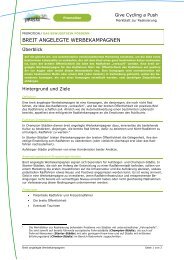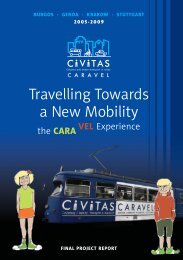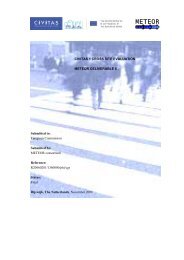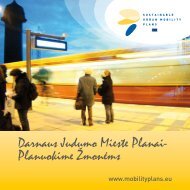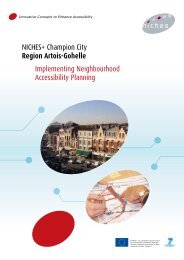VOYAGER Good Practice Case Studies - Rupprecht Consult
VOYAGER Good Practice Case Studies - Rupprecht Consult
VOYAGER Good Practice Case Studies - Rupprecht Consult
You also want an ePaper? Increase the reach of your titles
YUMPU automatically turns print PDFs into web optimized ePapers that Google loves.
cycling can benefit. Benefits for PT operators and authorities can derive from a better image,<br />
increased patronage and also from reduced congestion in the longer term.<br />
Thanks to the “Haller Willem” project, the overall quality of PT services in a low density area<br />
could be improved considerably. The project has successfully managed to revitalise a<br />
neglected railroad line and to turn it into a modern, comfortable, means of transport. The<br />
success of the project can particularly be seen in the number of passengers on the regional<br />
line, which rose from approximately 1,600 on weekdays in 1999 to 2,500 in Sep. 2000.<br />
The Demand Responsive Transport service (Drinbus) in Genoa is an example of a service, which<br />
responds to requests of individual passengers in areas, where a traditional public transport did not<br />
exist before. The social benefits of this service are significant, since it provides for many people a<br />
viable transport alternative to the single occupancy private car. After one year of operation, the<br />
results of the service are very encouraging: the new service is highly appreciated by the public, in<br />
particular by “captive” users, such as students, elderly and housewives. Drinbus is a service close<br />
to users. The high number of bus stops and the short distances between them ensure a good<br />
accessibility of the service to all users. The Drinbus case study also shows clear environmental<br />
benefits. The demand responsive transport service can help reducing emissions and pollution by<br />
substituting car trips, using methane vehicles and minimising distances without travellers.<br />
2.9 Integrated ticketing systems<br />
Overview of case studies<br />
As regards integrated ticketing systems, which allows the use of a broad range of transport modes<br />
within a region with only one ticket, the “Octopus system” from Hong Kong can be seen as one<br />
of the most advanced and successful examples. The “Octopus system” is a contact-less smart<br />
card system for the fare payment across all forms of public transport in Hong Kong using one<br />
single ticket. The Octopus system has extended from a transport payment system to a general e-<br />
payment system for small-value transactions. Octopus is known as the world's most successful<br />
experiment to date in stored-value, electronic cash cards.<br />
The NAVIGO smart card pass is the first big and flexible e-ticketing system in Europe, based on a<br />
contact-less smart card system. The main reasons behind the introduction of the contact-less<br />
ticketing system in the Ile-de-France region were to set up a more simple and fluid ticketing<br />
system, permitting individualised service for the customer. Furthermore, the combined use of<br />
various types of public transport and associated services should be made possible on one contactless<br />
smart card. The introduction of the NAVIGO smart card pass in the Ile-de-France region<br />
started in 2001 following the research and demonstration results obtained in the previous 10 years<br />
of deployment, supported by two major EU projects: ICARE and CALYPSO. The NAVIGO smart<br />
card pass is designed for all passenger carriers and for all modes of transport.<br />
Impacts on horizontal issues<br />
As can be seen by the examples of Paris and Hong Kong, smart card based ticketing systems can<br />
bring benefits for both, the customers and the operators. In these cities smart card ticketing<br />
systems have been introduced that are a fast, reliable, cost-effective and convenient method of PT<br />
fare payment and collection.<br />
The number of Octopus cards as well as transactions that take place each day across the<br />
networks of the service providers of the Octopus system in Hong Kong has steadily increased over<br />
the last years. This shows the high degree of acceptance of the Octopus system amongst the<br />
citizens. But also for the PT operators involved in the Octopus system, significant benefits can be<br />
achieved in terms of cost savings, enhanced equipment performance, more operational efficiency,<br />
flexibility of fare schemes, increased security and marketing opportunities.<br />
20


